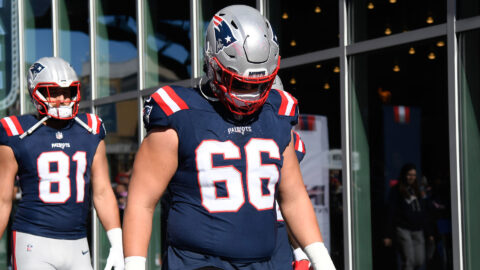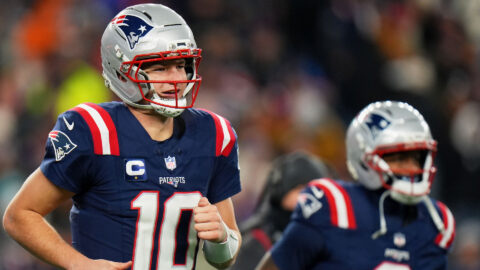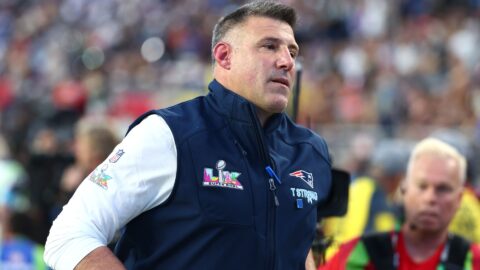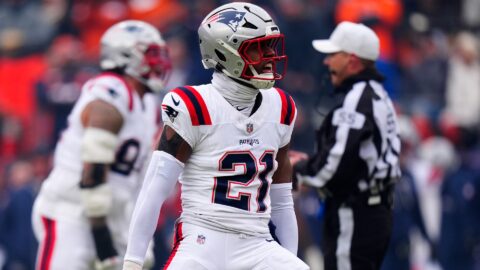In Boston's Biggest Sports Legend tournament, Red Sox great Pedro Martinez fell to Bruins legend Phil Esposito, 54.2 to 44.8 percent.
Esposito advanced to the round of 16 while perhaps the greatest pitcher in baseball history takes a seat. It is unfathomable that Martinez is not considered one of the top 16 legends in Boston history.
When Martinez joined the Red Sox for the 1998 season, he joined a team in shambles. Out of the 1997 squad, only Tom Gordon in the starting rotation and Butch Henry and Jim Corsi in the bullpen had ERAs below 4.00. The team had just finished fourth in the division before general manager Dan Duquette shook up the baseball world by acquiring Martinez for prospects Carl Pavano and Tony Armas.
At this point, while baseball fever in Boston was still at a high pitch thanks to the Impossible Dream 1967 squad, interest was waning. Martinez changed that.
Every time Martinez stepped onto the field, not only did he throw up zeroes, but he caused a jolt of electricity to ripple through the crowd. It was tangible even for those watching at home, as Pedro was must-see TV. Apologies to Curt Schilling, Josh Beckett and Jon Lester, but no one since has jolted the crowd like Pedro did.
In his first season, the Red Sox finished in second while Pedro went 19-7 with a 2.89 ERA in 233 2/3 innings and finished second in Cy Young voting. Not too shabby, but baseball fans hadn't seen anything yet.
What Pedro was about to embark on in the next two seasons was the greatest pitching campaign ever engineered by a pitcher — and in the home run era, no less.
From 1999-2000, Petey went an obscene 41-10 over 430 1/3 innings with a 1.90 ERA and 597 whiffs. He won the pitching Triple Crown in 1999, posting a 2.07 ERA, 23 wins and 313 whiffs.
That dominance is further established by using a statistic called adjusted ERA, or ERA+. It takes ERA and puts it in historical and park context. This helps factor in the offensive climate of the late '90s and early 2000s, as opposed to the pitching haven that was the 1960s, and puts pitchers on an even field no matter what park they pitched in. Martinez had a 234 ERA+ in 1999 (100 is average) and 291 in 2000.
The latter mark is the best mark any pitcher has put together in modern history and second behind Tim Keefe's 295 set back in 1880. (Keefe went 6-6 with an 0.86 ERA in 12 starts and 105 innings for the Troy Trojans, so it's debatable if Keefe's statistics should count in this context.)
While Martinez posted a scintillating 1.74 ERA in 2000, his 18-6 record was not as impressive — until you consider that in Martinez's six losses, his ERA (2.44) remained lower than the National League's best pitcher (Kevin Brown, 2.58), so he simply was a victim of poor run support. (Zack Greinke of the Royals can identify with that.) His ERA was a third of the park-adjusted league ERA of 4.97, which tops baseball history.
Martinez's two-season total of a 543 ERA+ also tops major league history, just barely edging Greg Maddux's 533 combined ERA+ from 1994-95.
According to ERA+, Martinez is currently the second-best pitcher in the history of the game, with a career average of 154. He's the best starting pitcher on the list topped by Mariano Rivera's 204.
Martinez is also 13th on the all-time strikeout list with 3,154 — and if he has his way, will return in 2010 to add more.
His strikeout numbers are simply gaudy, and he holds numerous distinctions. For example, between August 1999 and April 2000, Martinez had 10 consecutive starts with 10 or more strikeouts. During the 1999 season, he set the record for most consecutive innings pitched with a strikeout with 40. He also struck out three batters on nine pitches on May 18, 2002, against the Seattle Mariners.
Martinez won the Cy Young in both 1999 and 2000, finishing second in MVP voting in 1999 – but he should have finished first.
The diminutive Dominican (listed at an official height of 5-foot-11) received the most first-place votes of any player, but George King of New York and LaVelle Neal of Minneapolis completely omitted the right-hander from their ballots (all he needed was one last-place finish to win the award, which instead went to Ivan Rodriguez). The arguments the two writers presented were that pitchers should not be considered MVP, although King had put two pitchers on his ballot the season prior and put Mariano Rivera on a future ballot for Cy Young.
And thus, Martinez was deprived from a well-deserved MVP award. "It really made [writers] all look very dumb," said Buster Olney, who covered the Yankees for The New York Times and now works for ESPN. "People were operating under different rules. The question of eligibility is a very basic thing. People were determining eligibility for themselves."
Martinez went on to post ERAs of 2.39, 2.26 and 2.22 the next three seasons, continuing his string of dominance. He then experienced a regression in 2004 — posting what was up to that point a career-worst 3.90 ERA – yet still hurled 217 innings and helped Boston clinch its first World Series since 1918.
Martinez was also a delight off the field. He openly questioned just who Karim Garcia was and scoffed at the notion that the Red Sox suffered from the Curse of the Babe, suggesting that perhaps Babe Ruth should wake up from his long slumber and face Pedro.
"Maybe I’ll drill him in the ass," the ace observed.
And of course, who can forget his decree that before he was famous, he once sat under a mango tree without 50 cents to pay for a bus?
Martinez always had a winning smile and loved to pull off antics such as taping Nomar Garciaparra to a dugout pole or using a wastepaper basket as a helmet during the 2004 ALCS celebration.
Martinez is part of some of the most memorable moments in Red Sox history — ranging from his duel with Roger Clemens on May 28, 2000 (when Trot Nixon finally broke up a 0-0 game in the ninth with a home run) to his six innings out of the bullpen to shut the door on the Cleveland Indians in Game 5 of the 1999 ALDS, relieving an ineffective Bret Saberhagen and Derek Lowe. The two had combined to give up eight runs before Petey ran in despite battling a stomach flu.
Petey also was embroiled in many fights. Who could forget the Gerald Wallace tete-a-tete on Aug. 29, 2000, when Martinez came close to a no-hitter, or the Don Zimmer debacle in Game 3 of the 2003 ALDS, the same game that sparked the Karim Garcia fued? (Martinez flirted with numerous perfect games and no-hitters, but the closest he came was on June 3, 1995, with the Montreal Expos when he tossed nine perfect frames, only to lose it in the 10th.)
Martinez also was on the mound in Yankee Stadium for the famed Game 7, when manager Grady Little let a clearly tiring Pedro remain in the game, frittering away a lead that would later swing the Yankees' way on Aaron Boone's walk-off home run in the 11th inning. "Who's your daddy?" Indeed.
The crowning achievement to Pedro's career might have been the 1999 All-Star Game, held at Fenway Park. After goosebumps were raised when the All-Century Team was named and then crowded around guest Ted Williams, Martinez breathed fire – striking out the first four batters of the game (Barry Larkin, Larry Walker, Sammy Sosa and Mark McGwire). He was the first pitcher to accomplish the feat in the All-Star Game and went on to walk Matt Williams before punching out Jeff Bagwell.
Pedro moved on after 2004 and pitched for the New York Mets and Philadelphia Phillies, struggling with injuries and ineffectiveness. He represented Philadelphia in the 2009 World Series, pitching in Games 4 and 6 — losing both despite a strong effort in Game 4. The Yankees clinched the World Series in Game 6.
What he meant to Boston, however, was not lost upon his grand return June 28, 2006, as a member of the Mets.
Pedro was given a rousing standing ovation as he walked out to the bullpen to warm up for the game. He was showered with love while throwing, which continued as he walked back to the dugout. The (figurative) roof almost came off when he toed the mound in the top of the first. Even Nomar Garciaparra's return last season with Oakland and on "Nomar Day" this year pales in comparison.
Martinez was rocked for three innings and eight runs before hitting the disabled list, and the Red Sox remain the only team Pedro does not have a victory against. How fitting.
Yes, Phil Esposito is a Hall of Famer and was key to the Bruins' two Stanley Cup reigns in 1970 and 1972, but he did not transcend baseball and become a national and local icon like Pedro Martinez did.
Pedro Martinez is one of baseball's best in history and is Boston's best to ever step on a mound. He deserves to be recognized as one of the greatest — certainly top 16 — legends in Boston sports history.



